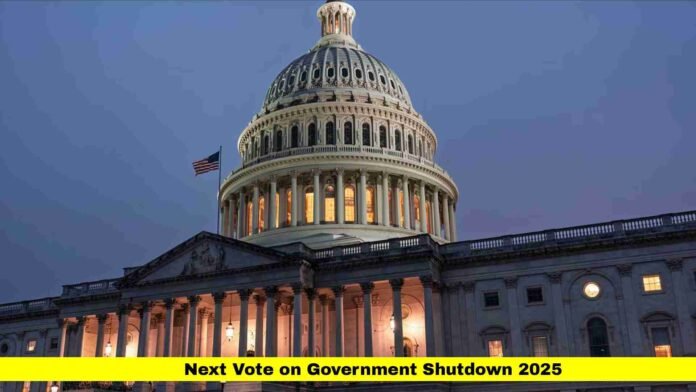All eyes are on the next vote on government shutdown 2025, as lawmakers attempt to resolve the ongoing federal funding stalemate. The shutdown, which began on October 1, 2025, has already forced hundreds of thousands of federal employees to work without pay or take furloughs. With the vote approaching, the nation awaits a resolution that could reopen federal agencies and restore essential services.
Current Status of the Shutdown
The government shutdown started when Congress failed to pass a comprehensive funding bill before the October 1 deadline. Since then, federal agencies have been operating at minimal capacity. Essential services, including national parks, federal courts, and visa processing, have experienced delays or temporary closures.
Federal employees face significant challenges, with many either furloughed or working without pay. Contractors and businesses dependent on federal funding are also affected, creating a ripple effect across the economy. As the shutdown enters its third week, pressure on Congress to act has intensified, with the next scheduled vote becoming a focal point for lawmakers and the public alike.
The Next Vote: What to Expect
The Senate is scheduled to hold the next vote on government shutdown 2025 to consider a bill aimed at temporarily reopening federal agencies. The proposed bill would fund government operations through a short-term extension, but partisan divisions remain deep.
Republicans are pushing for a measure that primarily ensures military funding and essential operations. Democrats, on the other hand, are demanding provisions that include healthcare support, protections for Medicaid, and funding for other public programs. The vote outcome is uncertain, as it requires enough bipartisan support to overcome procedural hurdles.
Key Issues Dividing Lawmakers
Several critical issues are fueling the deadlock in Congress:
- Healthcare Subsidies: Democrats want the continuation of Affordable Care Act subsidies that are at risk of expiring. They argue that failing to extend these subsidies would negatively affect millions of Americans who rely on affordable healthcare.
- Medicaid Funding: Restoring cuts to Medicaid is another priority for Democrats, who emphasize the importance of protecting vulnerable populations dependent on public health programs.
- Military and Essential Services: Republicans are focused on ensuring military readiness and essential federal services while resisting broader spending measures. They argue that temporary funding is needed to keep the government running while negotiations continue.
- Short-Term vs. Long-Term Funding: The debate between passing a short-term bill versus negotiating a long-term funding agreement has stalled progress. Republicans favor a temporary measure to reopen agencies immediately, while Democrats insist on a more comprehensive plan that addresses key social services.
Potential Outcomes of the Upcoming Vote
If the Senate passes the bill during the next vote, federal agencies would reopen, and employees would return to work with pay restored. Contractors and other organizations reliant on federal funding would also resume normal operations.
However, if the vote fails, the shutdown could continue for weeks, potentially becoming one of the longest in U.S. history. A prolonged shutdown would exacerbate its impact on federal employees, public services, and the broader economy, increasing pressure on lawmakers to negotiate a compromise quickly.
Impact on Federal Employees and Services
The government shutdown has already affected millions of Americans directly and indirectly:
- Furloughs and Unpaid Work: Hundreds of thousands of federal employees are either furloughed or working without pay, creating financial hardships for families.
- Disrupted Services: Agencies have scaled back operations, leading to delays in national parks access, federal court proceedings, and administrative services such as visa processing.
- Economic Strain: Small businesses, contractors, and communities that depend on federal spending are feeling the economic impact, with some struggling to maintain operations amid delayed payments.
Public Sentiment and Political Pressure
Public opinion is largely critical of Congress, with many Americans frustrated by the inability to resolve the shutdown. Widespread dissatisfaction is putting additional pressure on lawmakers to find a solution quickly. Citizens have voiced concern about the disruption to federal services, the financial strain on employees, and the broader economic consequences.
Both parties face scrutiny from constituents, which could influence negotiations leading up to the next vote. Political pressure is expected to intensify in the days before the Senate reconvenes, as the public and advocacy groups call for swift action to reopen the government.
Looking Ahead
The next vote on government shutdown 2025 is scheduled for the coming week and will determine the immediate future of federal operations. Lawmakers must either pass a temporary funding bill or continue negotiations to prevent further disruption. The outcome will significantly affect federal employees, essential services, and communities across the country.
Federal employees and the public are advised to stay informed about updates from government agencies. Being prepared for potential delays or continued disruptions can help individuals manage personal and professional responsibilities during this uncertain period.
